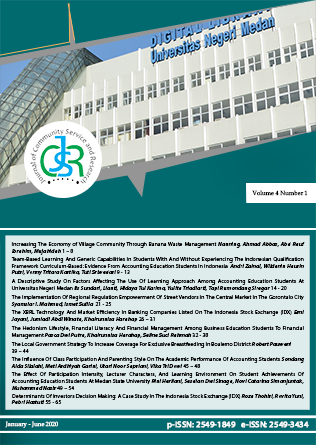THE HEDONISM LIFESTYLE, FINANCIAL LITERACY AND FINANCIAL MANAGEMENT AMONG BUSINESS EDUCATION STUDENTS TO FINANCIAL MANAGEMENT
DOI:
https://doi.org/10.24114/jcrs.v4i1.18287Abstract
The problem of this research is the poor management of student finances. This study aims to determine how much influence the lifestyle of hedonism and financial literacy on student financial management. The population of this study includes all of the Business Education students batch of 2017 with a sample of 90 respondents. The research instrument test uses the validity and reliability test carried out with the SPSS 22 for Windows software application. Research data analysis techniques: normality test, linearity test, multicollinearity test, multiple linear, F-test using the SPSS software application. The result of this research show that hedonism lifestyle has a negative and significant effect on student financial management; financial literacy has a positive and significant effect on student financial management. The results of this study indicate that there is a significant influence on the lifestyle of hedonism and financial literacy on student financial management, both partially and simultaneously. Keywords: Hedonism Lifestyle; Financial Literacy; Financial Management.Downloads
Published
2020-06-20
Issue
Section
Articles
License
Authors who publish with this journal agree to the following terms:
- Authors retain copyright and grant the journal right of first publication with the work simultaneously licensed under a Creative Commons Attribution License that allows others to share the work with an acknowledgment of the work's authorship and initial publication in this journal.
- Authors are able to enter into separate, additional contractual arrangements for the non-exclusive distribution of the journal's published version of the work (e.g., post it to an institutional repository or publish it in a book), with an acknowledgment of its initial publication in this journal.
- Authors are permitted and encouraged to post their work online (e.g., in institutional repositories or on their website) prior to and during the submission process, as it can lead to productive exchanges, as well as earlier and greater citation of published work (See The Effect of Open Access).
- This work is licensed under a Creative Commons Attribution-ShareAlike 4.0 International License.
This work is licensed under a Creative Commons Attribution-ShareAlike 4.0 International License.


